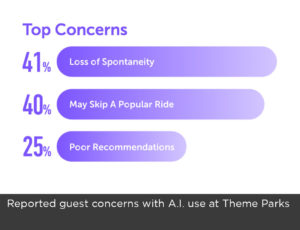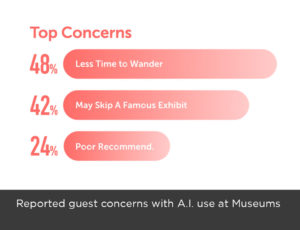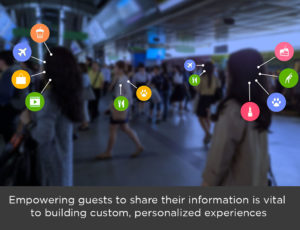Trend Report Deep Dive: Taming the Algorithm
- Featured
- White Papers
The “Algorithm.”
As a colloquial term for the recommendation engines responsible for customizing many of our online search results and social media feeds, the ‘Algorithm’ has, perhaps surprisingly, emerged as one of the more controversial forms of artificial intelligence (A.I) technologies within public discourse.
Developed as a tool to help people find what they’re looking for faster and discover new things matched to their interests, the ‘Algorithm’ has also been criticized for the way it can lead to self-reinforcing consumption habits, particularly within social media, which could partially explain trends for political polarization and extremist ideologies. Despite these misgivings, most people still use (and even enjoy) at least some forms of the ‘Algorithm’ as part of their daily online experiences, and the technology is even becoming more integrated into many physical location-based experiences as well, a trend that is unlikely to reverse.
Thinkwell’s 6th Annual Guest Experience Trend Report was an opportunity to predict and envision new ways we expect to see A.I. technologies (such as recommendation algorithms) become incorporated into theme parks, museums, and resorts. Yet, more importantly, it was also a chance to reflect and listen to what our guests actually want from these technologies and experiences.
As part of the trend report survey of over 1,300 people, participants were given hypothetical concepts of A.I. technologies applied to theme parks, museums, and resorts, and were asked to rate their favorite and least favorite aspects of the experience. Among these concepts were several that incorporated recommendation algorithms as part of the guest experience:
- A theme park could eliminate queues with virtual queuing and A.I. recommended scheduling.
- A museum could create a personalized digital tour based on the visitor’s interests.
- A resort during a busy holiday could automatically schedule reservations and activities that guests might like when they become available.
Participants rated all these concepts positively overall, each with its own particular reasons for why they liked it. Yet when asked about potential concerns with these concepts, one consistent trend emerged across all the data:
Guests want control over their experiences.

For all of these three concepts, the most disliked aspect was the technology’s proposed ability to structure the guest experience and make plans for them, which was perceived to reduce guests’ sense of personal agency and spontaneity. These concerns were shared by between 41% to 51% of participants in each category.
Interestingly, this concern was separate from the participant’s confidence in a recommendation algorithm’s ability to accurately make good recommendations. For the resort concept, 50% of respondents said they wanted more control over their plans, while only 33% reported that they didn’t trust the algorithm to make good recommendations. This may suggest there’s a subset of people who expect to enjoy what the system recommends but will still dislike the fact that they weren’t given the freedom to choose it for themselves. A further 37% of participants specifically called out the ability to discover new activities as a top reason in favor of the concept.

Indeed, when separated from the mandatory planning aspects, participants responded quite positively to the technology’s ability to suggest recommendations based on their interests. While 48% of respondents to the museum concept were concerned about their ability to freely wander (the most common concern), 53% of participants still selected “I’ll see unique exhibits more related to my interests” as a positive reaction. This feature gained the single highest positive response rate out of any of the multiple museum concepts in the survey. While visitor attractions always strive to offer guests as much choice as possible, with increasing demand for quality guest experiences, it has become necessary for capacity management systems such as virtual queues and pre-planned booking to limit guests’ options.
Online tickets for museums often mean committing to a specific date; popular resort activities require advanced reservations; and virtual queues for attractions often assign limited return windows. Recommendation algorithms can help these systems offer guests better choices when faced with limited options, but it can also turn guests against the recommendations entirely if they come to associate it with the technology that is limiting their ability to engage the way they want.

Recommendation technologies applied to location-based experiences should always be used to empower guests. For the near-future, it’s important to give guests a reason to trust the ‘Algorithm’ as a way to discover better experiences that are already available to them. If restrictions are necessary, do so in a transparent way that allows guests to retain as much control over their experience as possible, without asking any more from guests than what is absolutely needed.
Looking further ahead, it’s possible that A.I. technology will become sufficiently advanced so these recommendations and restrictions can become effectively invisible to guests. Imagine, with detailed probabilistic forecasting, an A.I. system could figure out for each guest the most likely paths they’ll take and decisions they’ll make, and hold several ‘phantom’ reservations for their most likely desired options. These invisible digital reservations could be in a state of constant reassignment by the system as demand fluctuates and the algorithm updates its recommended forecast with new real-time data. A ‘phantom’ reservation would only become tangible and activated the moment the guest arrives at the restaurant, attraction, or special exhibit… just as if it had been the guest’s spontaneous choice all along.
Obviously, there are many logistical and technological challenges to overcome in order to make this vision a reality. But the development of A.I. technologies won’t be slowing down. As experience designers, it’s essential to do our own forecasting of future possibilities, and that includes understanding what our guests actually want. It’s clear that artificial intelligence can’t become a substitute for human decision-making. As humans, we all want to be treated with respect for the choices we make by our own free agency. Sometimes, that also means relying on a trusted recommendation.
Related Posts
Access for All
- White Papers
The wheelchair access queue line, the closed-captioning on a ride...